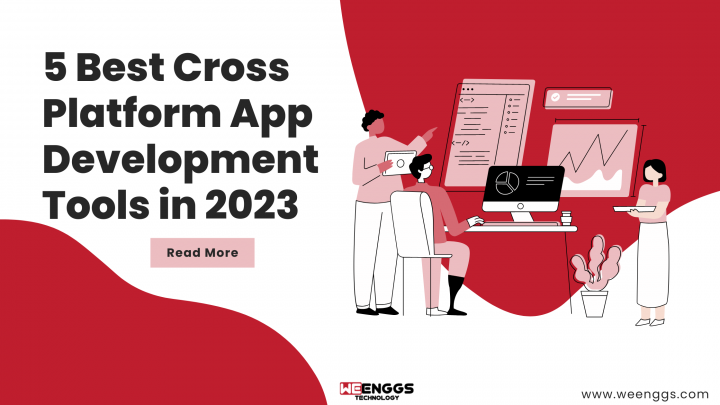For the last few years, the demand for mobile development has increased. However, with an increase in demand brings the challenges for all the developers who need to develop an app for multiple platforms.
Unlike the earlier time, developers now are required to target multiple platforms which can be either Android, iOS, Microsoft etc.
Being a developer and decision maker, how can you solve the problem of developing apps for multiple platforms?
In order to solve the problem, cross-platform mobile development solutions have come to light as the most chosen software development solution. Its ability to run on multiple mobile platforms has made it more popular. Now, it has become so easy for developers to develop cross-platform apps.
What is Cross-platform App Development Framework?
Cross-Platform App Development Framework is basically a single codebase mobile developers use to build applications for various platforms such as Android and iOS. By using this, a developer can accelerate the mobile app development process by saving time to write a code for each operating system.
There are multiple tools available in the market with which are in demand to develop cross-platform mobile apps. In the next section you will get ideas about various widely cross-platform mobile development tools.
Weenggs Recommended Tools:
We’ve tried to choose the best tools that you can consider for developing cross-platform mobile apps.
1) Xaramin:
A open-source development platform now owned by Microsoft allows you develop and write cross-platform applications for different operating systems in C# and .NET.
Features:
- Free – Open Source – Cross-platform
- It is trusted by many enterprises and loved by many developers.
- Xaramin apps are Native and Performant.
- You can get a consistent look across different platforms.
Programming Language: C# and .NET
2) Flutter:
Flutter is a free, open-source SDK (Software Development Kit) by google for cross-platform mobile app development. Launched in 2018 by Google with its own ‘Dart object-oriented programming language’, Flutter has become the most chosen mobile app development framework.
With a use of single platform-agnostic codebase, it helps app developers to build scalable and performant applications with its attractive UI. It’s pre-made widget libraries are advantageous to those people with limited experience of developing or launching their own mobile applications.
Features:
- It’s a single codebase and easy to use
- It helps offering an excellent user experience
- It owns its rendering engines rather than rely on web browser technology for drawing widgets.
- You can see the changes as soon as you change the code without recompling it.
Programming Language: Dart
3) React Native:
React Native is an open-source, robust, and fast UI software framework created by Meta. Based on Javascript Libraries it allows app developers to create natively rendered mobile apps.
Features:
- It allows developers to see changes on the moment in React Components with the help of the Fast Refresh element.
- React Native developers are able to get instant access to new features.
- It is much easier to integrate it directly with any implemented software and hardware solution.
- It can be utilized on a huge scale when data-heavy functionalities come into a picture such as 3D, AR, and VR animations etc.
Programming Language: JavaScript
4) Ionic:
An open-source UI toolkit, Ionic is helpful to build hybrid mobile and desktop app with a use of combined web and native technologies such as HTML, CSS, and JavaScript with integrations of various frameworks like React, Angular, and Vue. Considering the importance of look and feel of the app, Ionic framework mainly focuses on front-end UI/UX.
Features:
- A single shared codebase allows to create a single and workable UIs for all app platforms
- Easy to learn and develop app with use of Ionic for developers having a basic knowledge of CSS, HTML, or JavaScript frameworks
- Highly customized themes and components allow easy adaptability on the different running applications.
Programming Language: Javascript (Angular, React or Vue)
5) Kotlin:
With focus on cross-platform app development Kotlin allows you to generate/write the same code on different platforms directly. Different operating systems such as Android, iOS and other allow developers to store the reusable codes for more than two apps.
Features:
- It provides dual codes for different platform, one platform specific code and second common shared code by platforms.
- It’s time saving as it allows shared codes between platforms so you don’t need to rewrite or generate code for different platforms.
- Features like code sharing and IDE support and Null safety makes the development process faster and less complex.
Programming Language: Kotlin/JVM, Kotlin/JavaScript, Kotlin/Native
Conclusion:
In a nutshell, with increase in demand for mobile app developments, demand for cross-platform development also has increased. There are many cross-platform app development tools available. We, Weenggs Technology has depicted some of you as per our best choices. The selection of the cross-platform tool will be depend on your target market and their requirements.
Weenggs Technology will help you with the best cross platform app development solution. Raise your query at sales@weenggs.com.


